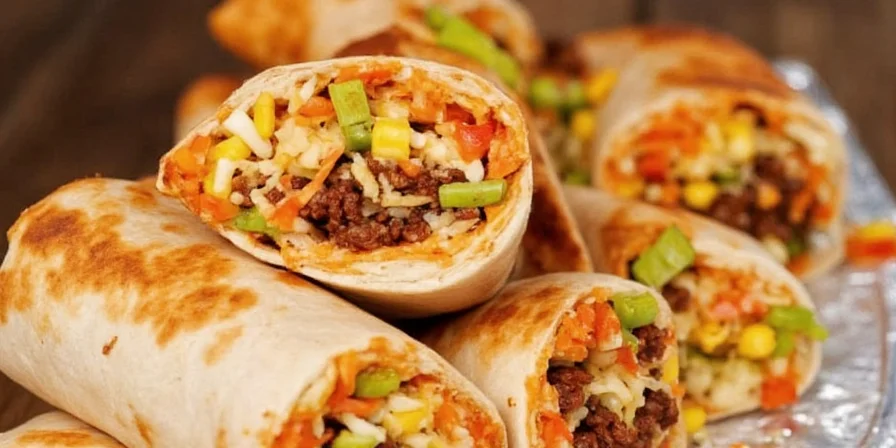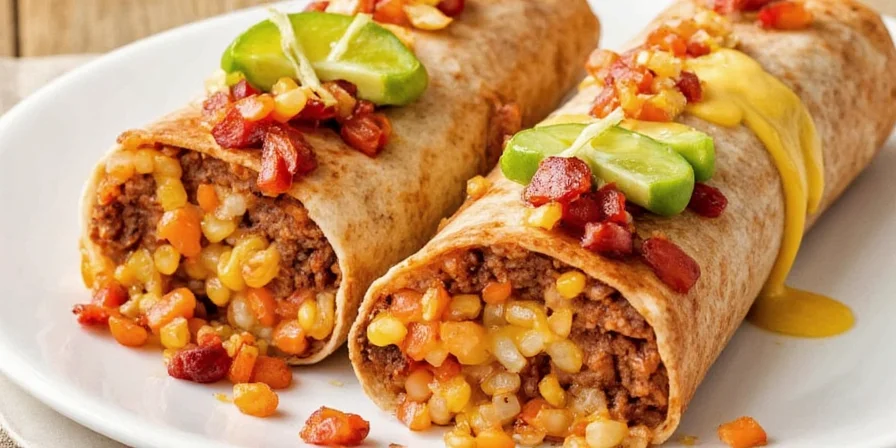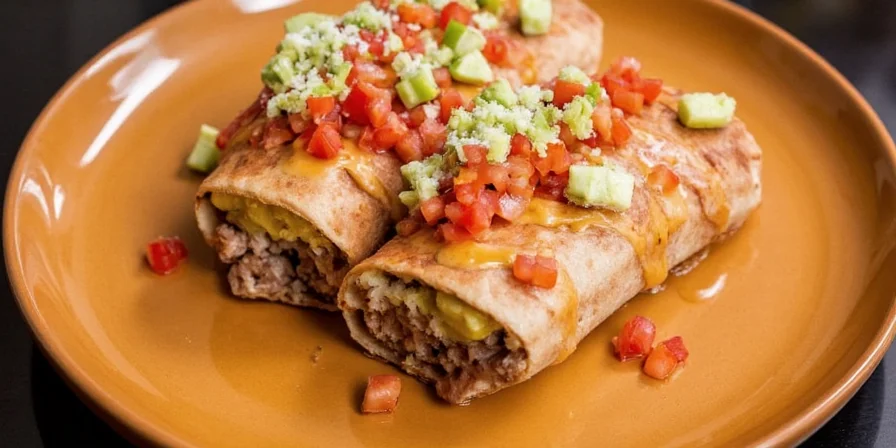
Quick Answer: What Is a Chili Colorado Burrito & How to Make It Right
A Chili Colorado Burrito features slow-cooked shredded beef smothered in rich red chili sauce made from dried guajillo and ancho peppers, wrapped in a warm flour tortilla with rice, beans, and cooling toppings. This Southwestern US specialty delivers balanced heat (2/5 spiciness) with deep smoky flavor—not overwhelming fire. For the authentic version that locals love, toast dried chilies first, simmer meat for 2+ hours, and wrap tightly with rice and beans for perfect texture.
Authentic Chili Colorado Burrito Recipe (Serves 4)
Prep Time: 25 minutes | Cook Time: 2 hours 15 minutes | Total: 2 hours 40 minutes
| Category | Ingredients | Measurement |
|---|---|---|
| Chili Sauce Base | Dried guajillo chilies | 6 large, stems/seeds removed |
| Chili Sauce Base | Dried ancho chilies | 4 large, stems/seeds removed |
| Chili Sauce Base | White onion, quartered | 1 medium |
| Chili Sauce Base | Garlic cloves | 4 |
| Chili Sauce Base | Tomato paste | 2 tbsp |
| Meat & Seasoning | Beef chuck roast | 2 lbs, cut into 2" cubes |
| Meat & Seasoning | Cumin | 1.5 tsp |
| Meat & Seasoning | Oregano | 1 tsp |
| Meat & Seasoning | Apple cider vinegar | 2 tbsp |
| Tortilla & Fillings | Flour tortillas (10") | 4 large |
| Tortilla & Fillings | Cooked white rice | 2 cups |
| Tortilla & Fillings | Refried beans | 1.5 cups |
| Toppings | Avocado, diced | 1 large |
| Toppings | Lime crema (sour cream + lime zest) | 1/2 cup |
Step-by-Step Preparation Guide
- Toast & rehydrate chilies: Heat dry skillet over medium. Toast guajillo and ancho chilies 30 seconds per side until fragrant. Transfer to bowl, cover with boiling water, and soak 20 minutes.
- Prepare sauce base: Drain chilies, reserving 1 cup soaking liquid. Blend chilies with onion, garlic, tomato paste, cumin, oregano, and 1/2 cup soaking liquid until smooth.
- Brown meat: Season chuck roast with salt. Sear in Dutch oven over medium-high heat until browned on all sides (8-10 minutes).
- Simmer chili: Pour chili sauce over meat. Add vinegar and remaining soaking liquid. Bring to simmer, then cover and cook on low heat for 2 hours until meat shreds easily.
- Shred & thicken: Remove meat, shred with forks, return to pot. Simmer uncovered 15 minutes to thicken sauce.
- Warm components: Heat tortillas 30 seconds per side in dry skillet. Warm rice and beans separately.
- Assemble burritos: Layer rice, beans, chili, avocado, and crema on center of tortilla. Fold sides inward, roll tightly from bottom.

Why This Recipe Works: The Science of Authentic Flavor
Traditional Chili Colorado Burrito gets its distinctive character from dried chilies—not fresh peppers. Guajillo (2,500-5,000 SHU) and ancho (1,000-2,000 SHU) create balanced heat with deep fruitiness. The 2-hour simmering time breaks down tough meat fibers while allowing capsaicin to distribute evenly—creating that signature slow-building warmth rather than instant burn.
| Chili Type | Flavor Profile | Ideal Use in Burritos | Heat Level (SHU) |
|---|---|---|---|
| Guajillo | Berry-like, tangy | Primary sauce base | 2,500-5,000 |
| Ancho | Prune, raisin notes | Flavor depth enhancer | 1,000-2,000 |
| Chipotle | Smoky, tobacco | Optional 1-chili addition | 2,500-8,000 |
Cultural Origins: Beyond Just a Spicy Wrap
While often mistaken for Mexican cuisine, Chili Colorado ("red chili") emerged in 19th-century New Mexico as settlers adapted indigenous Pueblo drying techniques with Spanish cooking methods. Unlike Mexican moles that use fresh chilies, this Southwestern US specialty relies on dried varieties for its signature deep red color and complex flavor. The burrito format evolved later as a practical handheld version of the traditional plate meal.
Troubleshooting Common Mistakes
- Soggy tortillas? Always warm them first and layer rice/beans as a moisture barrier before adding chili
- Sauce too thin? Simmer uncovered for 10-15 minutes after shredding meat to reduce liquid
- Not spicy enough? Add 1/4 tsp cayenne during simmering—never at the end
- Too acidic? Balance with 1 tsp honey or brown sugar if using vinegar
Adaptations for Dietary Needs
| Dietary Need | Best Adaptation | Flavor Impact |
|---|---|---|
| Vegetarian | Portobello mushrooms + textured vegetable protein | Earthy, meaty texture maintained |
| Gluten-Free | Corn tortillas (smaller size) | Slightly crumbly but authentic Southwest style |
| Milder Heat | Remove all chili seeds before toasting | Flavor remains but heat drops 50% |
Frequently Asked Questions
What's the difference between Chili Colorado and regular chili?
Traditional chili uses fresh tomatoes and ground meat with varied spices. Authentic Chili Colorado specifically uses dried red chilies as the primary ingredient, resulting in deeper color and more complex flavor without tomato dominance. It's always made with shredded (not ground) meat.
Can I make this in a slow cooker?
Yes—after toasting chilies and browning meat, transfer everything to slow cooker and cook on low for 6-8 hours. The extended time develops even richer flavor, but reduce liquid by 1/4 cup since slow cookers don't evaporate as much.
Why is my sauce bitter?
Bitterness comes from over-toasting chilies or burning the sauce base. Toast chilies just until fragrant (30 seconds max per side) and cook sauce on medium-low. If already bitter, add 1 tsp honey and a splash of vinegar to balance.
How to store and reheat properly?
Store components separately: chili up to 4 days refrigerated or 3 months frozen; rice/beans up to 5 days. Reheat chili with 2 tbsp water to restore moisture. Assemble fresh when serving for best texture.

Final Tips for Restaurant-Quality Results
The secret to authentic Chili Colorado Burrito lies in patience: proper chili toasting, sufficient simmer time, and strategic assembly. For the best experience, use lard instead of oil when warming tortillas—it creates superior pliability without breaking. Remember that true Southwest flavor balances heat with complexity; if your sauce tastes one-dimensional, add 1/4 tsp dried Mexican oregano during the last 30 minutes of simmering. Whether you're meal-prepping or cooking for guests, this recipe delivers the rich, slow-building warmth that defines the region's culinary heritage.










 浙公网安备
33010002000092号
浙公网安备
33010002000092号 浙B2-20120091-4
浙B2-20120091-4